As Literary Sofa aficionados will know, I produce a Summer Reads selection in May consisting entirely of new or forthcoming releases and follow up with my personal summer holiday TBR, the only time I mention books I have not yet read in full. And then in September – that’s now! – I come back to share my verdict on them, or in this case, those I read. There are two I will read at a later date (Bel Canto and The Vegetarian), and another, Summertime, which I added as an impulse read.
As it was very hot in Provence I didn’t do much except read and swim, which was blissful. I made some good choices considering I’m (reluctantly) in über-critical mode; the standard of writing ranged between excellent and absolutely stunning; all were intellectually satisfying, emotionally intelligent or both. They raised a lot of issues that interest or touch me on a personal level and as a writer and I have far more to say about each of them than space permits.
ALL MY PUNY SORROWS – MIRIAM TOEWS
It’s not hard to see why many readers have been moved by this novel based on the family life of the author. Suicide is obviously a difficult and potentially off-putting subject to tackle and I preferred this attempt to some others I’ve encountered. There were many passages of exceptional insight which I highlighted. However, whilst noir-ish humour is undoubtedly a key element in leavening the darkness, for me it became a little grating and deflected from the poignancy at times. I felt the narrator’s pain and desperation keenly despite being alienated by some of her actions in the interests of protecting her sister. Since it was mentioned in the comments on my original post, I wasn’t that bothered by the lack of speech marks, although it was sometimes impossible to know if she was thinking or saying something – seems like an unnecessary hurdle.
A DEATH IN THE FAMILY – KARL OVE KNAUSGAARD
Well, I am pleased to have experienced the Marmite phenomenon that is Knausgaard, although I emerged feeling surprisingly neutral and am not tempted by the next five volumes. I was half expecting to take a massive dislike to him, which didn’t happen, and it was worth it for the atmospheric and visual sense of Norway (and Sweden), which enabled me to picture everything as if watching a film. There were some extremely beautiful and profound passages and this book is one of several on today’s list which plunged me into reflections on what constitutes a dysfunctional family situation and what simply lies within ‘normal’ parameters – whilst I did empathise with him, there was nothing here that particularly shocked me – we all ‘struggle’ but perhaps that’s the point. The exhaustive (-ing) detailing of every item purchased at the supermarket, which cleaning product he used for which surface and myriad routine tasks drove me to the outer limits of endurance (and for what it’s worth, I don’t buy that this is ‘stream of consciousness’). Once again this raised the issue of how writing about emotion, family and domesticity is perceived differently according to whether the author is male or female (I discussed this in my recent essay on Writing about Love if you’re interested).
SUMMERTIME – VANESSA LAFAYE
This novel set in the 1930s caught my eye last year but it was only after recently crossing paths with the author online that I got around to reading it. A good novel based on unfamiliar historical events always feels like double value – I read for pleasure but also to learn, and to experience things beyond my own life and understanding. Since I was planning to say it anyway, rather than in response to the current polemic: to the extent that I can judge (I wouldn’t previously have felt the need to say that), Vanessa Lafaye tackles the challenge of writing across racial identity with respect and sensitivity. She also captures the tensions between the small town Florida community and the veteran outsiders enduring hard labour and appalling conditions, all as a devastating storm approaches. The writing is sensory and evocative and considering the bleakness of the situation – which is confronted head on – there is a warmth and luminescence to this story without resorting to cosiness.
L’HOMME QUI MENT – MARC LAVOINE
This short memoir by French actor and singer Marc Lavoine, examining his relationship with his errant and unreliable father, is a beautiful piece of writing. I found it incredibly poignant and like one of the journalists quoted on the back cover, I was struck by his compassion and forgiveness despite the emotional scars inflicted by his father’s behaviour, which I’ll admit enraged me more than once. It reminded me a lot of Jeanette Walls’ powerful memoir The Glass Castle. Like its author, this book is proving popular in France – the language isn’t complex so if you’re able to, I highly recommend reading this one.
EVERYONE IS WATCHING – MEGAN BRADBURY
Tempting here to launch into what does, or doesn’t, make a novel – suffice to say that anyone who considers the traditional elements of strong narrative arc, character development, etc indispensable will find those conventions challenged by this text-in-fragments. For that matter, it didn’t deliver what I normally hope for in a novel either, but given the quality of the result, I was happy to engage with it on its own terms. For anyone who enjoys literary writing and is crazy about New York, this work promises and delivers great things. I found the story of urban planner Robert Moses’ legacy fascinating, especially as I am familiar with many of the places (and indeed have written about some of them – I was excited to see a mention of Sunset Park pool in Brooklyn). The Whitman thread didn’t work as well for me as the Mapplethorpe and (Edmund) White vignettes which are full of passion, creativity and as per someone else’s observation (can’t remember where I saw this), ‘a lot of cock’.
VERNON SUBUTEX (VOLUME 1) – VIRGINIE DESPENTES
Given that this was the unrivalled standout amongst my holiday reading, it’s frustrating for all concerned that it won’t be available in translation until next year, but if you read French to a very high level – it’s chock-a-block with wordplay, slang, etc – profitez-en and get to it right away would be my advice. As I mentioned in the original listing, Despentes’ CV is itself a colourful story and boy, does this woman know how to write one! Sometimes dubbed the ‘female Houellebecq’, in my view she writes with far more emotional intelligence and heart and a less of an obvious desire to offend and provoke. I correctly anticipated something along the lines of Jennifer Egan’s A Visit to the Goon Squad and loved this just as much (which is saying something). This novel demonstrates outstanding characterization and plotting, social commentary and mastery of nuance and tonal variation: it is profound, crude, hilarious, shocking and moving. It is at once very franco-centric – anyone who knows Paris well will be in heaven – yet universal. Above all I hope Despentes becomes huge in the anglophone world, which desperately needs more women writing fiction like this, and more opportunities to get it out there.
THE GIRLS – EMMA CLINE
Hype, buzz, huge exposure… these are things I imagine most authors dream of. This novel has featured in countless Summer Reads selections both here and in the States and although I tend not to make a beeline for those books, this one tempted me because I love California and am interested in female sexuality and adolescence and its portrayal in fiction. The ‘problem’ with very high profile books is the enormous expectations that come with that; readers justifiably hope for something exceptional, and it’s impossible for any book to deliver that to everyone who picks it up. I know all this, but it doesn’t stop me having those expectations or turning up the critical radar to the max. So here’s my honest verdict: I enjoyed this book but no more than the many other good ones I’ve read this season. The author is very talented and knows a lot more words than I do. There was much to admire in her insights into teenage angst, suburban living, and the descriptions of violence and squalor were uncomfortably vivid. However, I had mixed feelings about the superimposing of the character as an older woman and its effect on the story, both in terms of structure and narration, and ultimately, its ability to fully engage this reader.
THE CORRECTIONS – JONATHAN FRANZEN
I am not generally a re-reader, and it was a risk to return to a novel I loved 15 years ago. One of my reasons was that I could remember almost nothing about it and was intrigued to see what had made such a big impression on me. It turned to be a very worthwhile exercise, full of painful prophesy and resonance of a very personal kind, none of which I could have forseen or understood in my mid-thirties. It shocked me to realise how my view of myself, my family, everything, has moved on. This is something that serial re-readers often speak of, seeing different layers each time. There is a lot of humour, wisdom and empathy in this novel – it restores my view of Franzen, which has been somewhat challenged along the way. I always like the feeling that there’s a living human being behind a story.
This wasn’t meant to be so long but I hope you enjoyed it! I’d love to hear your thoughts on any of the above that you’ve read or the books that you’ve picked up this summer.
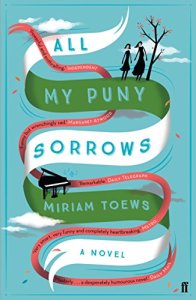
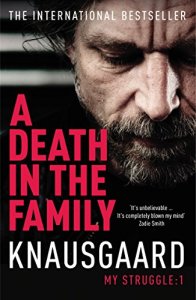
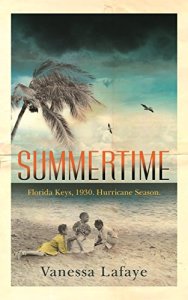
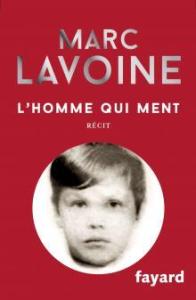
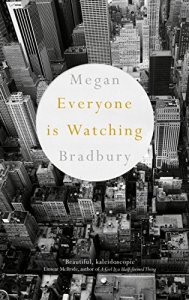
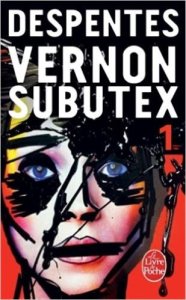
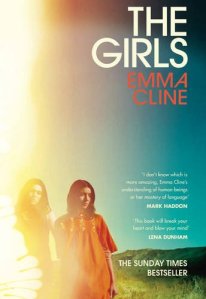
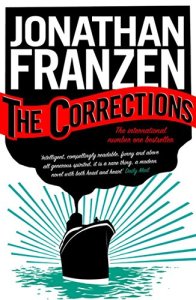

Lol ! As ever we agree on the French books ……I’m afraid I’m a dyed in the wool Knausgirl ….absolutely adore his writing . Believe it or not No 2 is actually very funny esp about family life .
Posted by hastanton | September 15, 2016, 14:23Don’t apologise -you’re in good company! At least I didn’t hate it although clearly I don’t get what makes people so crazy about Knausgaard. If I didn’t have my own writing and the blog, I suppose I might give him another go, but so many books… Look forward to sharing views on Vernon 2!
Posted by Isabel Costello | September 16, 2016, 14:18I’ve been considering reading The Girls but have been burnt too many times by books about adolescence. Similarly with the Toews – I loved A Complicated Kindness but haven’t liked anything else by her I’ve tried. I might have to give All My Puny Sorrows a try though, given how many people have told me she’s back on form!
Posted by drlauratisdall | September 15, 2016, 14:34I’m definitely glad I read All my Puny Sorrows, and as for books about female adolescence, maybe I need to have a break because they’re starting to feel a bit samey. For me, The Girls suffered by comparison to Girls on Fire, which I included in my Summer Reads 2016 selection. I was interested to see from your blog that you weren’t sold on that one, so do let me know what you make of TG if you decide to take the plunge!
Posted by Isabel Costello | September 16, 2016, 14:22I read My Name is Leon – Kit De Waal, Everything Love Is – Claire King and The Essex Serpent – Sarah Perry, which was a tremendous sequence and all of which I can thoroughly recommend.
I’ve just finished The Many – Wyl Menmuir and while it’s very well written and I did enjoy it, I failed to appreciate why it had generated such acclaim so I can resonate with what you were saying about ‘The Girls’. Sometimes like ‘My Name is Leon’ the praise is justified but often than not, I’m sat there thinking ‘Well, it was ok but….’ Station Eleven was another book that was very well written but really didn’t tread new ground for me. I’m also left cold by many of the books that seem to get on prize lists so I’m obviously not quite in tune with the industry.
Posted by Peter Domican | September 15, 2016, 21:16Hi Pete, I think as with so many aspects of the book business, there is a huge degree of subjectivity when it comes to which books are singled out to be huge, which get nominated for prizes, etc. On the whole I am more interested in reading and supporting those that don’t necessarily find the spotlight, but are often just as deserving. Often those which impress me most get little or no attention or publicity, and it’s not that my taste is particularly niche! I do agree about My Name is Leon though, and hope to see it do well in the next Bailey’s, perhaps.
Posted by Isabel Costello | September 16, 2016, 14:26Completely agree on The Girls. I haven’t reviewed it yet and might not. I enjoyed the parts set in the youthful summer but I thought the sections with the character as an older woman should’ve been cut. They didn’t add anything.
As for this comment ‘It shocked me to realise how my view of myself, my family, everything, has moved on.’ I hear ya, loud and clear. It’s interesting though, isn’t it? And I don’t know about you but recognising that has made an enormous difference to my own writing.
Posted by naomifrisby | September 18, 2016, 11:31Thanks for commenting, Naomi and sorry it slipped my mind that I hadn’t replied! How interesting that we (independently) had such a similar reaction to The Girls. I think that removing the older woman’s perspective would have had big implications for the main story too, because I could sense her voice and experience in that narrative. (They both used words I had to look up!) As this conversation shows, it’s a fascinating book for writers to learn from and if only for that reason, I’m glad I read it!
I completely agree with what you say about recognising how our personal experience as writers impacts on all aspects of our work. For me, although I put ‘a lot of myself’ into it, the most important thing is always to inhabit the character as deeply as possible and let them take shape as their own people – a challenge, but also the part I love the most. In Paris Mon Amour I had to think and feel my way into the head of a 17 year old girl (the stepdaughter), a 23 year old man (the lover) and I even had to watch out with the main character Alexandra, who’s less than 10 years younger than me. I look forward to reading your novel one day!
Posted by Isabel Costello | September 24, 2016, 15:06